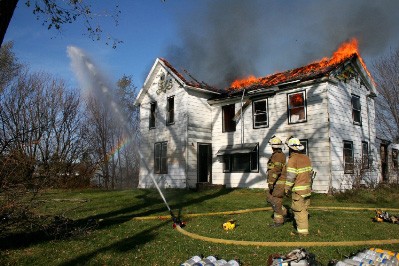Electrical Fires & Home Insurance: What You Need to Know
Blamed on everything from clothes dryers to extension cords, electrical fires cause heartache and headaches for thousands of Americans every year.
Electrical failures or malfunctions were listed as factors in an estimated 46,500 home fires reported to U.S. fire departments a year according to the National Fire Protection Association.
The price tag for property damage caused by home electrical fires comes to a hefty $1.5 billion a year. Overall, electrical fires account for 13% of reported home fires in the U.S.
While damage from an electrical fire can add up quickly, most homeowner’s insurance policies provide substantial coverage for the losses. Compared with insurance for other threats such as floods and hurricanes, “fire is still the one you have the broadest protection for,” says Amy Bach, executive director of United Policyholders, a nonprofit organization that educates consumers about insurance. You’ll also want to find out what is covered by your home insurance in a fire.

House fires from electrical appliances are a top cause for starting a home fire. Most homeowner insurance providers will cover electrical fires, but the amount you will be reimbursed and the reasoning for the fire will vary your outcome for amount of reimbursement.
Here are six things you need to know about electrical fires and home insurance policies.
How to File an Insurance Claim for Electrical Fires
1. Document the damage.
If your home is damaged by an electrical fire, take pictures of the affected area as soon as it’s safely possible, says Bill Begal, president of Begal Enterprises Inc., a Maryland company specializing in disaster restoration. Make sure you have a copy of your insurance policy; read it to determine your rights and responsibilities when dealing with your insurance company.
Then get a notebook and record all dates, times, and people you talk to regarding your insurance claim, Begal says. “You’re going to be talking to many people and will be dealing with things that are new to you if you’ve never had an electrical fire before – write everything down to keep it all straight,” he says.
2. Keep the claim open.
“Extreme heat and air quality are the two main issues in a fire,” Bach says.
For a partial-loss fire, keep your claim open for at least six months. This will give you time to detect problems that may not show up immediately, such as outdoor plants that have been damaged in the fire but don’t wither immediately.
3. Clean or replace smoke-damaged items.
Most homeowner’s insurance policies cover damage caused by smoke during a home fire. This may include bills to have items such as curtains or rugs professionally cleaned. If you take smoke-damaged furnishings to a professional cleaning service and it’s determined the items can’t be salvaged, your insurance company may pay to replace them.
4. Realize that mold may not be covered.
If an electrical fire occurs in part of your home, the local fire department may use powerful hoses to stop the fire from spreading. These firefighting efforts might not just get rid of the flames; they also could leave a good deal of water in the walls. Problems with mold, especially in wet drywall, could develop as a result.
Coverage for this type of damage may be excluded in a homeowner’s policy or the amount of coverage may be limited, Bach says. During the last several years, some insurance companies have excluded mold damage in certain policies. Read your policy to know what’s covered; in the event of a fire, have your home’s drywall, as well as the underlying wood on the interior and exterior of the house, inspected for mold damage.
5. Look into safety-related discounts.
You may be able to get a discount of at least 5 percent on your home insurance premium for installing certain safety devices, such as a smoke detector, according to the Insurance Information Institute.
Some companies offer bigger discounts for more sophisticated devices, including a sprinkler system, and a fire and burglar alarm that notifies police or fire departments when there’s an emergency. State Farm, for instance, offers a discount on homeowner’s insurance for the installation of fire sprinklers. Allstate provides discounts for smoke alarms and fire extinguishers.
6. Focus on home fire prevention.
The National Fire Protection Association’s report indicate that about half of home electrical fires involved electrical distribution or lighting equipment, including outlets, circuit wiring and extension cords. And nearly 50 percent involved equipment such as washers and dryers, fans, space heaters and air-conditioning systems.
Check your home’s wiring on a regular basis, such as at the beginning of summer and at the start of winter, says Tom Olshanski, a spokesman for the U.S. Fire Administration. Look for outlets that don’t work, light switches that are hot to touch and lights that flicker. If you notice anything that doesn’t look right, have it inspected by an electrician.
Also, take note of appliance use. “I unplug my toaster and coffeemaker when I’m not using them,” Begal says. Keep lamps on level surfaces, and use bulbs that match the lamp’s recommended wattage. You may also want to read up on a list of home fire prevention tips.
When you own your home, it’s smart to find full coverage insurance policies.
